8.1 Describing Daily Routine: Reflexive verbs (los verbos reflexivos)
8.1 Gramática: Describing Daily Routine: Reflexive verbs (los verbos reflexivos)
A. How do I recognize a reflexive verb?
The infinitive form of reflexive verbs will have a “SE” at the -ar, -er, and -ir ending.
Ejemplo: levantarse (to get up), vestirse (to get dressed)
The SE at the end of a verb is a red flag: “Hey! I am a reflexive verb!”
B. When do I use reflexive verbs?
A reflexive verb indicates that the subject does something to or for himself or herself. (actions done to oneself). Reflexive verbs ALWAYS use reflexive pronouns.
Subject: María
Reflexive: se ducha por la noche. (María showers at night.)
C. How do I conjugate reflexive verbs?
Here is the present tense of the verb levantarse (to get up) with reflexive pronouns. To conjugate, change the verb’s ending based on the subject as you normally do.
| levantarse: to get up | |
| (yo) me levanto: I get up | (nosotros) nos levantamos: we get up |
| (tú) te levantas: you (inf. sing.) get up | (vosotros) os levantáis: you (inf. pl. Spain) get up |
| (usted/él/ella) se levanta: you (pol. sing.) get up; he/she gets up | (ustedes/ellos/ellas) se levantan: you (plural) get up; they get up |

Los lunes, (yo) ME LEVANTO a las 7 am., pero mi hermanita SE LEVANTA a las 8 am. A ella le gusta QUEDARSE en cama.
D. Las actividades diarias
 |
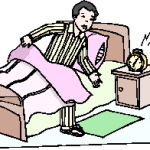 |
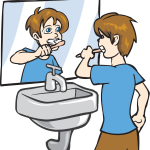 |
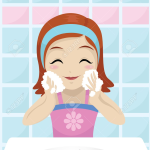 |
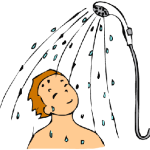 |
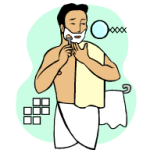 |
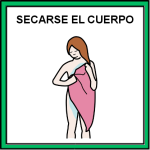 |
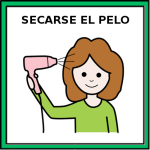 |
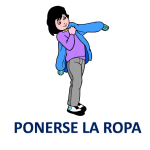 |
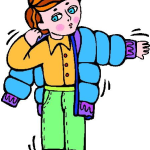 |
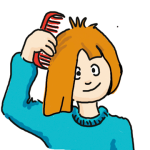 |
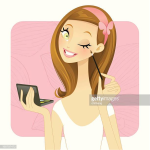 |
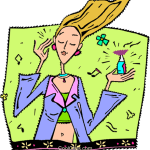 |
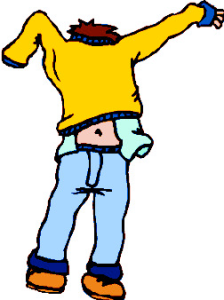 |
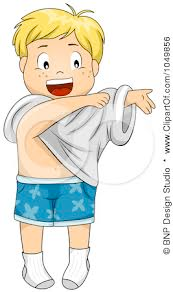 |
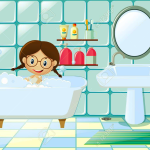 |
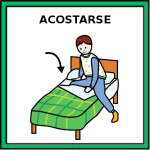 |
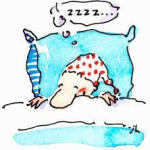 |
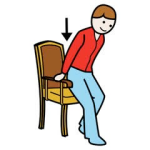 |
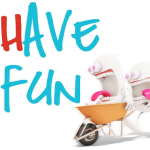 |
| Algunas partes del cuerpo | |
| la cara | face |
| el cuerpo | body |
| los dientes | teeth |
| la mano | hand |
| la nariz | nose |
| los ojos | eyes |
| el pelo; cabello | hair |
(yo) Me lavo el pelo tres veces a la semana, pero mi hermana se lo lava todos los días.
I wash my hair three times a week, but my sister washes it every day.
Mi mamá se maquilla la cara, pero no los ojos.
My mom puts makeup on her face but not on her eyes.
E. Common Reflexive Verbs
Following is a list of verbs with the reflexive pronouns ME (myself) and SE (himself, herself, yourself [polite singular.]) that you can use to describe your daily routine and that of someone else.
| Infinitive | ||
| Me acuesto / Se acuesta | acostarse | I go to bed / he-she goes to bed; you (pol. sing.) go to bed |
| Me despierto / Se despierta | despertarse | I wake up / he-she wakes up; you (pol. sing.) wake up |
| Me levanto / Se levanta | levantarse | I get up /he -she gets up; you (pol.sing.) get up |
| Me baño / Se baña | bañarse | I take a bath (shower) /he -she takes a bath; you (pol. sing.) take a bath |
| Me ducho / Se ducha | ducharse | I take a shower /he -she takes a shower; you (pol. sing.) take a shower |
| Me lavo el pelo / Se lava el pelo | lavarse el pelo | I wash my hair / he -she washes his-her hair; you (pol. sing.) wash your hair |
| Me seco / Se seca | secarse | I dry off /he -she dries off; you (pol. sing.) dry off |
| Me afeito / Se afeita | afeitarse | I shave/ he – she shaves; you (pol. sing.) shave |
| Me lavo (cepillo) los dientes / Se (cepilla) los dientes | lavarse los dientes | I brush my teeth/ he-she brushes his-her teeth; you (pol. sing.) brush your teeth |
| Me peino / Se peina | peinarse | I comb my hair/ he-she combs his-her hair; you (pol. sing.) comb your hair |
| Me maquillo / Se maquilla | maquillarse | I put on makeup / he-she puts on makeup; you (pol. sing.) put on makeup |
| Me pongo la ropa / Se pone la ropa | ponerse la ropa | I put on my clothes / he – she puts on his-her clothes; you (pol.sing.) put on your clothes |
| Me quito la ropa / Se quita la ropa | quitarse la ropa | I take off my clothes/he-she takes off his-her clothes; you (pol.sing.) take off your clothes |
| Me visto / Se viste | vestirse | I dress / he-she dresses; you (pol.sing.) dress |
| Me desvisto / Se desviste | desvestirse | I undress / he – she undresses; you (pol.sing.) dress |
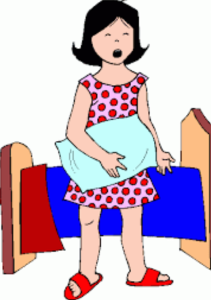
Los lunes, me levanto temprano. |
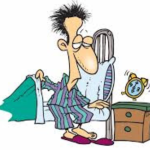
Mi esposo se levanta temprano también. |
*Reflexive pronouns are normally placed directly before the verb. HOWEVER, they may be attached to infinitives (ducharme) and present progressive (duchándome).
**When you have a two-verb phrase, you can place the pronoun attached to the second verb (prefiere peinarse) or at the beginning of the conjugated verb (se prefiere peinar).
COMPARE and CONTRAST
Unlike English, several verbs in Spanish can be reflexive or non-reflexive. To distinguish between when a verb may or may not be reflexive, consider the following:
Lavar (to wash) vs. Lavarse (to wash oneself)
If I wash the dishes–I am doing the washing but I am not the one being washed, then non-reflexive is used; LAVAR. However, if I wash my hands, I am the one doing the washing and being washed. The reflexive is used; LAVARSE.
Yo LAVO los platos todos los días. Ella LAVA los platos.

(yo) ME LAVO *las manos antes de comer. Ella SE LAVA las manos.
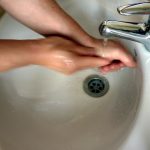
*Nota: Parts of the body or clothing are generally not referred to with possessives but with articles.
Los niños se lavan las manos. Yo necesito cepillarme los dientes.
 Actividad # 1
Actividad # 1
¡A conjugar! Conjugate the following reflexive verbs using the appropriate reflexive pronoun and verb ending. Then, fill in the blanks to complete the sentences below.
| Cepillarse: to brush oneself | |
| (yo) | (nosotros – as) |
| (tú) | (vosotros – as) |
| (usted/él/ella) | (ustedes/ellos/ellas) |
| Maquillarse: to put makeup on oneself | |
| (yo) | (nosotros -as) |
| (tú) | (vosotros- as) |
| (usted/él/ella) | (ustedes/ellos/ellas) |
| Ponerse: to put on oneself / to get | |
| (yo) | (nosotros -as) |
| (tú) | (vosotros -as) |
| (usted/él/ella) | (ustedes/ellos/ellas) |
| Despertarse: to wake up | |
| (yo) | (nosotros -as) |
| (tú) | (vosotros-as) |
| (usted/él/ella) | (ustedes/ellos/ellas) |
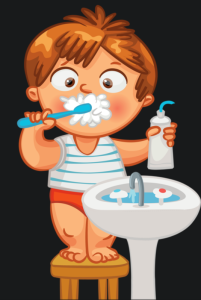
1. Este niño ____ ______ los dientes con el cepillo y la pasta dental.
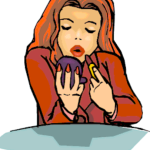
2. Lola ____ ________ por la mañana.
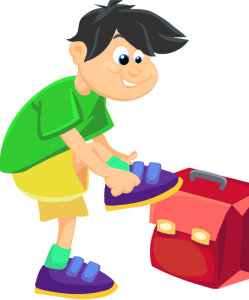
3. Pablito ____ ______ los zapatos.
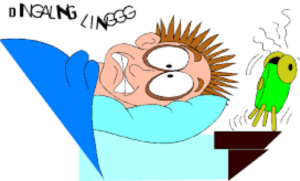
4. El señor ____ ______ muy enojado. No le gusta despertador.
 Actividad # 2
Actividad # 2
Escoger. Choose the sentence that best describes the following pictures.
 Actividad # 3
Actividad # 3
Tu rutina diaria. Number the following statements to put them in order according to your morning routine (The first thing you do in the morning will be number 1). Cross out any activities that do not apply to you.
________ Me lavo la cara ________ Me afeito la cara
______ Me despierto _______ Me cepillo los dientes (por la mañana)
______ Me afeito las piernas ______ Me cepillo los dientes (por la noche)
________ Me cepillo el cabello ________ Me levanto
________ Me ducho ________ Me maquillo
________ Me visto ________ Me acuesto
 Actividad # 4
Actividad # 4
Preguntas. Imagine that your little brother will ask you these questions. Answer them correctly.
Ejemplo:
¿Te lavas los dientes con jabón?
No, me lavo los dientes con pasta de dientes.
- ¿Te duchas a las 3:00 de la mañana?
- ¿Te levantas temprano los domingos?
- ¿Te afeitas en el carro?
- ¿Te lavas el pelo con pasta de dientes?
- ¿Te secas antes de ducharte?
- ¿Te lavas las manos con champú?
- ¿Te quitas la ropa en la universidad?
 Actividad # 5
Actividad # 5
Preguntas personales. Answer the following questions using the reflexive verbs with complete sentences. Then, interview a classmate in Spanish.
- ¿A qué hora te despiertas?
- ¿A qué hora te levantas?
- ¿Te duchas (te bañas) por la mañana o por la noche? ¿Qué marca de jabón usas?
- ¿Te lavas el pelo todos los días?
- ¿Te pones perfume / colonia todos los días? ¿Qué marca prefieres?
- ¿Te quitas los zapatos cuando llegas a casa?
- ¿A qué hora te acuestas? ¿Te gusta leer antes de acostarte o prefieres ver la televisión?
- ¿Cuántas horas duermes normalmente?
 Actividad # 6
Actividad # 6
¿Cómo te pones? How do you get (become)? Use reflexive verbs that show changes in emotion to answer the following questions about how you feel in different situations. You may use verbs more than once.
| Banco de palabras | ||||
| ponerse + adjective | frustrarse | enojarse | sentirse + adjective | alegrarse |
| to become… | to be frustrated | to be mad | to feel… | to be glad: happy |
Ejemplo:
¿Cómo te pones cuando no entiendes la lección de español?
Me pongo frustrado OR Me frustro OR Me enojo OR Me siento triste OR No me alegro
- ¿Cómo te pones cuando recibes una nota buena en un examen difícil?
- ¿Cómo te pones cuando tienes una entrevista de trabajo?
- ¿Cómo te pones cuando encuentras veinte dólares en tu bolsillo (pocket)?
- ¿Cómo te pones cuando no duermes bien?
- ¿Cómo te pones cuando pasas tiempo con amigos o familia?
- ¿Cómo te pones cuando un amigo te miente (lies to you)?
- ¿Cómo te pones cuando tienes que estudiar para un examen?

 Actividad # 7
Actividad # 7
Preguntas personales. With a partner, take turns asking each other these questions.
Ejemplo:
E1: ¿Qué haces cuando te sientes triste?
E2: Cuándo me siento triste, escucho música.
- ¿Qué haces cuando te sientes triste?
________________________________________ - ¿Qué haces cuando te sientes alegre?
________________________________________ - ¿Qué haces cuando te sientes enfermo (a)?
________________________________________ - ¿Qué te pone feliz?
________________________________________ - ¿Qué te preocupa?
________________________________________ - ¿Te enojas frecuentemente? ¿Con qué o quién?
________________________________________

